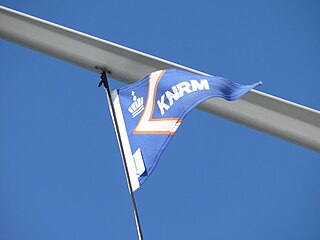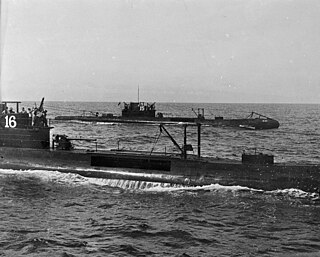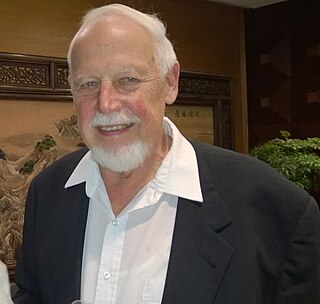Related Research Articles

The Royal Netherlands Sea Rescue Institution is the voluntary organization in the Netherlands tasked with saving lives at sea. For that purpose, it maintains 45 lifeboat stations along the Dutch coast of the North Sea and Wadden Sea and on the IJsselmeer. It maintains 78 boats ranging from small boat to 21 meter long RHIBs. It also provides lifeguard services at some beaches on the Frisian Islands in the Waddensea, and the beach of Wassenaar. Its headquarters have been in IJmuiden since 1996.

The Smithsonian Tropical Research Institute is located in Panama and is the only bureau of the Smithsonian Institution based outside of the United States. It is dedicated to understanding the past, present, and future of tropical ecosystems and their relevance to human welfare. STRI grew out of a small field station established in 1923 on Barro Colorado Island in the Panama Canal Zone to become one of the world's leading tropical research organizations. STRI's facilities provide for long-term ecological studies in the tropics and are used by some 1,200 visiting scientists from academic and research institutions around the world every year.

Leiden University Libraries is a library founded in 1575 in Leiden, Netherlands. It is regarded as a significant place in the development of European culture: it is a part of a small number of cultural centres that gave direction to the development and spread of knowledge during the Enlightenment. This was due particularly to the simultaneous presence of a unique collection of exceptional sources and scholars. Holdings include approximately 5,200,000 volumes, 1,000,000 e-books, 70,000 e-journals, 2,000 current paper journals, 60,000 Oriental and Western manuscripts, 500,000 letters, 100,000 maps, 100,000 prints, 12,000 drawings, 300,000 photographs and 3,000 cuneiform tablets. The library manages the largest collections worldwide on Indonesia and the Caribbean. Furthermore, Leiden University Libraries is the only heritage organization in The Netherlands with five registrations of documents in UNESCO's international Memory of the World Register.

The Royal Library of the Netherlands is the national library of the Netherlands, based in The Hague, founded in 1798.
Hendrik (Henk) Tennekes was the director of research at the Royal Dutch Meteorological Institute, and was a Professor of Aeronautical Engineering at Pennsylvania State University and Professor of Meteorology at the Vrije Universiteit Amsterdam. He is known for his work in the fields of turbulence and multi-modal forecasting. He authored the textbooks The Simple Science of Flight: From Insects to Jumbo Jets and A First Course in Turbulence with John L. Lumley. The book "A First Course in Turbulence", is a classic that logs more than 12,000 citations on Google Scholar.

Adolph Cornelis 'Dolf' van Bruggen was a Dutch malacologist, entomologist, and botanist. His interest in the tropics and tropical Africa has dominated his broad scientific interest for more than 50 years now. He was an expert especially in the land snail families Streptaxidae, Achatinidae and Maizaniidae. As of 2008, he had authored some 655 scientific publications.

The O 21 class was a class of seven submarines, built for the Royal Netherlands Navy. The boats were still incomplete at the start of the German invasion of the Netherlands, O 21, O 22, O 23 and O 24 were hastily launched and escaped to the United Kingdom. O 25, O 26 and O 27 were not able to escape and were captured by the German forces. The Kriegsmarine ordered the completion of the boats and they entered German service as UD-3, UD-4 and UD-5. The submarines' diving depth was 100 meters (330 ft).

The K XIV class submarine was a class of five submarines, built for the Royal Netherlands Navy. Used for patrols in the Dutch colonial waters. The class comprised K XIV, K XV, K XVI, K XVII and K XVIII. The submarines diving depth was 80 m (260 ft). Three of the boats were lost in World War II.

Theodorus Cornelis Michael Josephus (Theo) van de Klundert is a Dutch economist, and Emeritus Professor of Economics at Tilburg University.

Frederik Pieter Agterberg is a Dutch-born Canadian mathematical geologist who served at the Geological Survey of Canada. He attended Utrecht University in The Netherlands from 1954 to 1961. He was instrumental in establishing International Association for Mathematical Geosciences. He received William Christian Krumbein Medal in 1978 from International Association for Mathematical Geosciences. In 1981 Agterberg became a correspondent of the Royal Netherlands Academy of Arts and Sciences. In 2004, he was named IAMG Distinguished Lecturer. He was the president of International Association for Mathematical Geosciences from 2004 to 2008. His contribution in Quantitative Stratigraphy in collaboration with Felix M. Gradstein is noteworthy.
Willem Johan van der Oord was a Dutch hydraulic engineer. He was involved in setting up the Mekong Committee and served as its Executive agent from December 1969 until June 1980. He also worked for the United Nations Economic and Social Commission for Asia and the Pacific.
Gerard Isaäc Lieftinck, known in print as G.I. Lieftinck, was a Dutch academic specialising in medieval European manuscripts.

Johannes Bernardus "Joop" Odenthal was a Dutch footballer, baseball player and football manager. He competed in the men's tournament at the 1952 Summer Olympics, representing the Netherlands.
Hendrik Frans Karel van Nierop is a historian of early-modern Holland and professor emeritus of the University of Amsterdam.
Jacobus Martinus Kaper is a biochemist and virologist who worked at the Henry A. Wallace Beltsville Agricultural Research Center of the Agricultural Research Service of the United States. He has performed research on the cucumber mosaic virus.
Hendrik Klaas Aldert"Henk"Visser was a Dutch pediatrician. He was professor of pediatrics at the Erasmus University Rotterdam and the Erasmus MC between 1967 and 1995.
Eduard Siegfried"Eddy"de Jongh is a Dutch art historian specialized in iconography. He was professor of art history with a teaching assignment in iconography at Utrecht University between 1976 and 1989.
Louis Mensse Schoonhoven is a Dutch entomologist. He was a professor of general and comparative animal physiology and later entomology at Wageningen University and Research between 1972 and 1991. He is a specialist in insect-plant relationships.
Petrus Josephus"Peter"van Kessel is a Dutch historian. He spent his career at the Royal Netherlands Institute in Rome, ultimately becoming vice director.
Hans de Kroon is a Dutch ecologist specializing in plant and insect life who works at Radboud University, where he chairs the Experimental Plant Ecology group. He is known for a 2007 study that concluded that in Germany "the abundance of flying insects has plunged by three-quarters over the past 25 years".
References
- 1 2 van de Kaa, D.J.; de Roo, Y. (2008). De Leden Van de Koninklijke Nederlandse Akademie Van Wetenschappen: Een Demografisch Perspectief: 1808 Tot 2008. Bijdragen Tot de Geschiedenis Van de KNAW Series (in Dutch). Koninklijke Nederlandse. p. 362. ISBN 978-90-6984-552-4 . Retrieved 24 February 2024.
- 1 2 "Accession 95-018 Wolda, Henk Henk Wolda Papers, circa 1974-1990". Smithsonian Institution Archives. Archived from the original on 2 October 2022.
- ↑ Bonilla, K.; Serafim, M.P.; Echeverría-King, L.F.F.; Karacan, D.B.; Ololade, O.O.; Pandey, N.; Mabotha, T.; Basaleem, H.O.; Dajani, R.; Babalola, O.O. (2023). Engaging Scientific Diasporas for Development: Policy and Practices. Frontiers Media SA. p. 130. ISBN 978-2-8325-1360-6 . Retrieved 17 February 2024.
- ↑ "Henk Wolda Insect Collection (STRI-HWIC)". Smithsonian Tropical Research Institute. Archived from the original on 4 December 2023.
- 1 2 Arnett, R.H.; Samuelson, G.A.; Nishida, G.M. (2019). The Insect & Spider Collections of the World. CRC Press Revivals. CRC Press. p. 136. ISBN 978-1-000-69700-1 . Retrieved 17 February 2024.
- ↑ "Henk Wolda" (in Dutch). Royal Netherlands Academy of Arts and Sciences. Archived from the original on 17 February 2024.